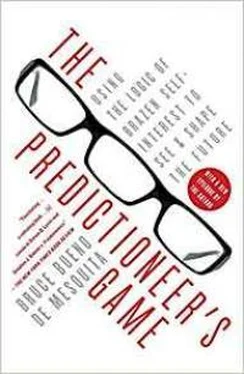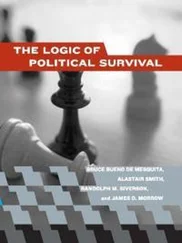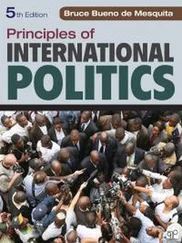You may be surprised to learn that buying cars and negotiating international crises are not all that different. In fact, I’ll show you how we go from buying a car to negotiating the North Korean nuclear threat. But before we do that, it’s time to dissect game theory a bit to reveal the principles that allow us to anticipate and shape the future.
2

GAME THEORY 101
WHEN PEOPLE TALK about science, subjects like chemistry and physics leap to mind. Political science certainly does not. But science is a method, not a subject. It is a method that relies on logical arguments and experimental evidence to figure out how the world of things—and of people—works. The scientific method certainly applies to politics just as it does to physics. Still, physics and politics are quite obviously entirely different subjects. One of the ways they differ is crucial for understanding everything that is to come. You see, the world of physics is pretty much about how particles interact. Now, the central feature of particle interactions is that photons, electrons, neutrons, or their constituent quarks never anticipate crashing into one another. Consequently, there is no strategizing behind the collision of particles.
Studying people is ever so much more complicated than studying inanimate particles. Just think how different interactions are between quarks and Quakers, electrons and electors, protons and protesters. People, and in fact just about every living thing, seem to have a survival instinct. Genes act as if they want to get passed on, bacteria find hosts, cockroaches flee my shoe, and ordinary people look out for what they think is good for them and try to avoid what they think is bad for them. That includes cooperating with friends and fighting with foes. Like the physicist’s particles, people interact, but unlike the physicist’s particles, people interact strategically. That is what game-theory thinking is all about.
To be a successful prognosticator, it is critical to think about how other people think about their problems. It is just as important to think about how other people think about how you think about your problems and theirs. The previous, tedious sentence, by the way, could be repeated ad infinitum to reflect on the information that gets ferreted out when thinking strategically. This and the next chapter—and the science of predictioneering—are about solving the problem of working out what others think, what they think you think, what you think they think, what you think they think you think. … This is the kind of information that physicists rightly don’t give a moment’s thought to when studying the particles that capture their interest—but it is the foundation from which we can see when and how to turn situations to our own advantage.
WHERE WE ARE HEADED
In Game Theory 101 we’ll consider how to look at the world through the eyes of others. For starters, we’ll need to set aside, at least for argument’s sake, our natural optimism about human nature. Game theory urges us to take a cold, hard look at what it means to be a calculating, rational decision maker. Sure, there are some genuinely nice, altruistic people in the world—but that doesn’t mean they aren’t carefully calculating their actions. In fact, we’ll see that even as nice and altruistic a person as Mother Teresa can be scrutinized through the not-so-warm-and-fuzzy eyes of a game theorist. Doing so will help us understand how paths as different as hers and a suicide bomber’s can be equally rational and strategically sensible. It will also help us realize that even some of the most unquestioned received wisdom—such as the existence of something called the national interest—may be just a strategic fiction created by politicians for their own advantage instead of ours. Depressing? Yes. Accurate? You bet.
This chapter will provide us with a framework for the game theorist’s notions of interests, beliefs, and rationality; a sense of how to use logic to cut through the fog of language; and an understanding of strategic behavior that, in conjunction with the previous two concepts, leads to an ability to better map and anticipate the thinking and actions of others.
WHAT ARE THE OTHER GUY’S
INTERESTS AND BELIEFS?
Game theory comes in two primary flavors. Cooperative game theory was invented by John von Neumann and Oskar Morgenstern. 1Their 1947 book on the subject drew a clear and compelling analogy between problems people (or nations) face and parlor games like charades or the name-in-the-hat game, a favorite in my family. These sorts of games deal with players who engage each other, trying to anticipate moves and countermoves, but only in a setting where what they say they will do is the same as what they actually do. That’s why it’s called cooperative game theory—a promise made is a promise kept. Because of this, one big limitation with cooperative game theory, especially in games that involve more than two players, is that it has far too optimistic a view of human nature. In this universe people make deals and keep them. They can be bought off, sure, but once they say they’ll do something, they do it. That means cooperative game theory works fine for zero-sum games where what one side loses equals what the other side wins, but not all that many interesting problems in the world are that cut and dried. When they are not, this original variety of game theory is not nearly as good for my purposes as what has replaced it.
By the early 1950s, the mathematician John Nash, the subject of A Beautiful Mind and the winner of the 1994 Nobel Prize in Economics, invented a different kind of game theory. 2He drew attention to the propensity people have not to cooperate with one another. Poker players and diplomats use polite terms, like “bluffing,” for what ordinary people mean when they say someone is a liar. In noncooperative games, promises do not necessarily mean anything. Lies are a part of strategizing. Promises are kept when a player decides it’s in her interest to do what she promised. When promises and interests differ, people renege, they break their word, they cheat, they do whatever they think will benefit them most. Of course, they know that bluffing and cheating can be costly. Therefore, they take prospective costs as well as benefits into account. In fact, raising costs is one way, albeit a difficult and painful way, of encouraging people to be truthful. Indeed, that is exactly the purpose behind meeting and then raising someone’s bet in poker or calling car dealers instead of going in to see them.
The view of people as cold, ruthless, and self-interested is at the heart of game-theory thinking. There may be room for nice guys, but not much. Most of the time, nice guys really do finish last. Those who will throw themselves on a hand grenade to save their fellows, well, they do so and then, tragically, they are dead. They are out of the game of life. We remember them, we honor them, we extol them, but we just don’t compete with them, because they are not here to compete with us. Such good souls need not occupy much of our time. Or, if they do, we applied game theorists take a cynical view and look for how suicide might benefit them. There might be virgins in heaven, or, as with kamikaze pilots in World War II, Crusaders in the Middle Ages, and some suicide bombers today, there might be significant financial incentives such as cash payments and debt forgiveness to their families in exchange for their sacrifice.
Some may find this materialistic explanation of personal sacrifice offensive. The trouble is, it’s a lot costlier to believe mistakenly in other people’s goodwill than it is to be a cynic and assume they’re looking out for themselves (until and unless their actions say otherwise). It is hard to get burned in personal dealings if you remember Ronald Reagan’s dictum: Trust but verify. For those who are offended by this tough view of human nature, I urge you to consider some facts.
Читать дальше













